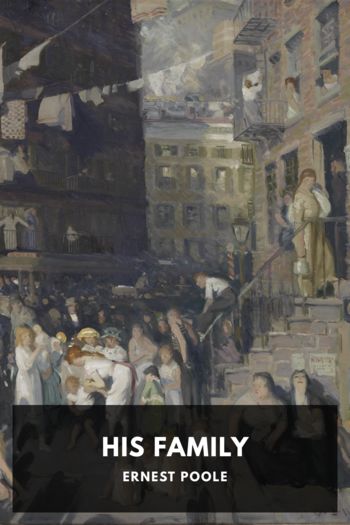His Family - Ernest Poole (ereader for comics .txt) 📗

- Author: Ernest Poole
Book online «His Family - Ernest Poole (ereader for comics .txt) 📗». Author Ernest Poole
“I’d like that, John—it will be a great help.”
“All right, Mr. Gale.” John stopped at the door. “And Miss Deborah,” he ventured. “Is she to get married just the same?”
“Oh, yes, I think so—later on.”
“Good night, sir.”
And John went out of the room.
When would Deborah be married? It came over Roger, when he was alone, how his family had shifted its center. Deborah would have come here to live, to love and be happy, a mother perhaps, but now she must find a home of her own. In her place would come Edith with her children. All would center on her in her grief.
And for no cause! Just a trick of chance, a street accident! And Roger grew bitter and rebelled. Bruce was not the one of the family to die. Bruce, so shrewd and vigorous, so vital, the practical man of affairs. Bruce had been going the pace that kills—yes, Roger had often thought of it. But that had nothing to do with this! If Bruce had died at fifty, say, as a result of the life he had chosen, the fierce exhausting city which he had loved as a man will love drink, then at least there would have been some sense of fairness in it all! If the town had let him alone till his time! But to be knocked down by an automobile! The devilish irony of it! No reason—nothing! Just hideous luck!
Well, life was like that. As for Edith and her children, he would be glad to have them here. Only, it would be different, the house would have to change again. He was sorry, too, for Deborah. No wedding trip as she had planned, no home awaiting her return.
So his mind went over his family.
But suddenly such thoughts fell away as trivial and of small account. For these people would still be alive. And Bruce was dead, and Roger was old. So he thought about Bruce and about himself, and all his children grew remote. “You will live on in our children’s lives.” Was there no other immortality? The clock ticked on the mantle and beside it “The Thinker” brooded down. And Roger looked up unafraid, but grim and gravely wondering.
XXIIBut there was a rugged practical side to the character of Roger Gale, and the next morning he was ashamed of the brooding thoughts which had come in the night. He shook them off as morbid, and resolutely set himself to what lay close before him. There was work to be done on Bruce’s affairs, and the work was a decided relief. Madge Deering, in the meantime, had offered to go with Edith and the children to the mountains and see them all well settled there. And a little talk he had with Madge relieved his mind still further. What a recovery she had made from the tragedy of years ago. How alert and wide-awake she seemed. If Edith could only grow like that.
Soon after their departure, one night when he was dining alone, he had a curious consciousness of the mingled presence of Edith and of Judith his wife. And this feeling grew so strong that several times he looked about in a startled, questioning manner. All at once his eye was caught by an old mahogany sideboard. It was Edith’s. It had been her mother’s. Edith, when she married, had wanted something from her old home. Well, now it was back in the family.
The rest of Edith’s furniture, he learned from Deborah that night, had been stored in the top of the house.
“Most of it,” she told him, “Edith will probably want to use in fitting up the children’s rooms.” With a twinge of foreboding, Roger felt the approaching change in his home.
“When do you plan to be married?” he asked.
“About the end of August. We couldn’t very well till then, without hurting poor Edith a little, you see. You know how she feels about such things—”
“Yes, I guess you’re right,” he agreed.
How everything centered ’round Edith, he thought. To pay the debts which Bruce had left would take all Roger had on hand; and from this time on his expenses, with five growing children here, would be a fast increasing drain. He would have to be careful and husband his strength, a thing he had always hated to do.
In the next few weeks, he worked hard in his office. He cut down his smoking, stayed home every evening and went to bed at ten o’clock. He tried to shut Deborah out of his mind. As for Laura, he barely gave her a thought. She dropped in one evening to bid him goodbye, for this summer again she was going abroad. She and her husband, she told him, were to motor through the Balkans and down into Italy. Her father gruffly answered that he hoped she would enjoy herself. It seemed infernally unfair that it should not be Deborah who was sailing the next morning. But when he felt himself growing annoyed, abruptly he put a check on himself. It was Edith he must think of now.
But curiously it happened, in this narrowing of his attention, that while he shut out two of his daughters, a mere outsider edged closer in.
Johnny Geer was a great help. He was back in Roger’s office, and with the sharp wits he had gained in his eighteen years of fighting for a chance to stay alive, now at Roger’s elbow John was watching like a hawk for all the little ways and means of pushing up the business. What a will the lad had to down bodily ills, what vim in the way he tackled each job. His shrewd and cheery companionship was a distraction and relief. John was so funny sometimes.
“Good morning, Mr. Gale,” he said, as Roger came into the office one day.
“Hello, Johnny. How are you?” Roger replied.
“Fine, thank you.” And John went





Comments (0)